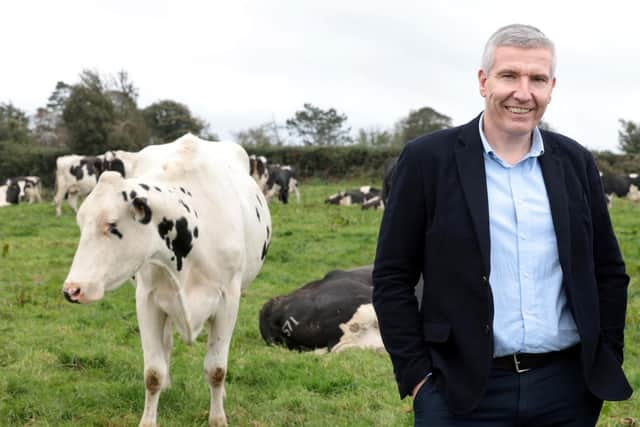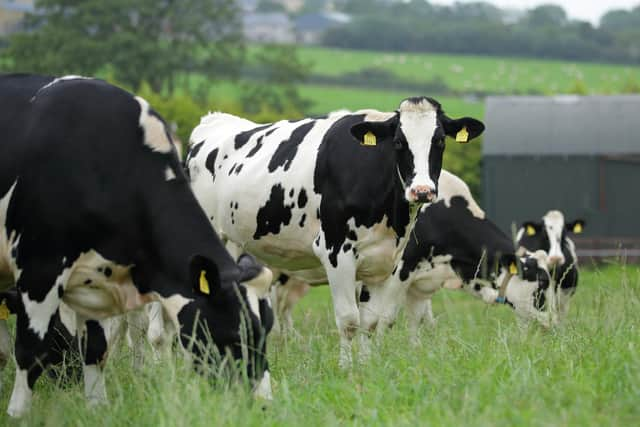Sustainable Dairy Fact Book makes the case for the effective use of farm performance data
and live on Freeview channel 276
The new publication centres around the theme ‘Data in Action’, highlighting the important role data plays across the dairy sector in making informed decisions to boost sustainability, lower emissions and improve efficiency.
According to DCNI chief executive, Ian Stevenson, the drivers for collection and use of accurate data sets by supply chains have never been greater.
Advertisement
Advertisement
This is because legislative targets, customer requirements, formal business reporting, sustainable financing and progress by other market operators are all coming into focus.


The dairy sector in Northern Ireland makes a huge contribution to the local economy.
It is worth almost £1.5 billion annually, sustaining the livelihoods of around 3,200 dairy farming families and over 2,200 employees of our dairy processors.
Ian Stevenson commented: “As we mark the end of the EU Sustainable Dairy programme with the launch of the sixth and final Sustainable Dairy Fact Book, we can reflect on the leadership and progress made to date and highlight the hard work and dedication of farmers and dairy processors in tackling climate change.
Advertisement
Advertisement
“Over the past six years, these publications have been a vehicle for sharing stories from across the dairy supply chain, profiling 12 local farmers, sharing initiatives from the three main dairy processing companies and featuring cutting-edge research and scientific knowledge from AFBI, CAFRE and DAERA.”


He continued: “The outlook is positive for the future sustainability of the sector.
“Our farmers and processors are following evidence-based guidance from the Department and from knowledge and research institutions such as CAFRE and AFBI, investing in new technologies, dedicated sustainability resources and implementing new processes all with the aim of being more sustainable.
“However, as a sector we are aware of the challenges ahead in relation to achieving net zero and lowering emissions and funding support will be needed from government to drive enhanced investment in sustainability initiatives.
Advertisement
Advertisement
“There doesn’t need to be a trade-off, both sustainability and profitability should, and can, live in coexistence.”
The Fact Book was produced as part of the EU Sustainable Dairy Campaign, a multi-country European Milk Forum promotion programme to highlight the positive role of the dairy sector for climate action and the environment.
So what is it actually telling us about the sustainability-related credentials of Northern Ireland’s milk industry in the here and now?
Ian Stevenson again: “The outlook is positive for the future sustainability of the sector.
Advertisement
Advertisement
“Our farmers and processors are following evidence-based guidance from the Department of Agriculture and from knowledge and research institutions such as CAFRE and AFBI, investing in new technologies and implementing new processes all with the aim of being more sustainable.
“There remains a considerable amount of work to be done to fully realise the contribution that our sector plays to the wider societal sustainability; especially in relation to on-farm carbon sequestration and storage and there is still a lot to be decided on future agricultural policy and how farmers are to be rewarded for the efforts they make to improve biodiversity and on farm sustainability.”
He continued: “There are also targets in place for the processing businesses that bring the dairy products to market, and our processors have made significant efforts to work more efficiently including sending less to landfill and harnessing sustainable forms of renewable energy.
“There doesn’t need to be a trade-off, both sustainability and profitability should, and can, live in coexistence.
Advertisement
Advertisement
The DCNI representative also makes the point that as the world continues to face the challenges of climate change, the growing influence of capturing and using data and adopting new technology across many sectors, including the dairy sector, are some of the most important tools in our arsenal when it comes to tackling climate change.
He further explained: “A shared problem calls for a shared solution, working collaboratively with Government, scientists, dairy processors and farmers will make agriculture more environmentally sustainable whilst also boosting productivity, efficiency and ultimately profitability.”
The EU Sustainable Dairy Programme is a European funded multi–country programme from the European Milk Forum (EMF), which includes the Dairy Council for Northern Ireland.
For the past six years, and in conjunction with colleagues across Europe, DCNI has endeavoured to share research, facts and solutions to both paint a picture of, and demonstrate, the work being done across the sector to create a more sustainable dairy industry in Northern Ireland.
ARCZero
Advertisement
Advertisement
The ARCZero project is specifically highlighted within the fact book as a bespoke response from Northern Ireland’s farm sectors to the challenge of climate change.
The initiative started out as a European Innovation Partnership (EIP) operational group made up from a coalition of seven farms from across Northern Ireland, including two dairy farms, as well as industry partners such as AgriSearch, Devenish, Queens University Belfast and Birnie Consultancy. The Programme is led by Professor John Gilliland OBE.
The farms are varied in terms of their climate, output and geography, and spread across Northern Ireland.
At the beginning of the project none of the participants had a full understanding of their baseline numbers in respect of greenhouse gas (GHG) emissions, carbon stocks in soil or the carbon stocks in trees and hedges, or how they would compare to benchmarked averages.
Advertisement
Advertisement
The initial aim of the project was to measure and manage carbon flows at an individual farm level in order to empower farmers to make positive change towards carbon zero farming and has now expanded to include soil health assessments for these farm systems.
ARCZero defines Net Zero on a farm as the gross annual Greenhouse Gas emissions, less gross annual carbon sequestration and adjusted for renewables and waste management systems.
As a result, the programme is producing accurate, individual, whole farm carbon balance sheets and takes precision measurements of on-farm carbon stocks (soils, trees and hedges) combining them with the results of a whole farm lifecycle analysis calculator.
This allows an accurate creation of a baseline greenhouse gas position.
Advertisement
Advertisement
By assessing future management practices and identifying the most impactful behaviours, the project intends to inform how farms across Northern Ireland can accelerate the move towards net carbon zero farming, improve the efficiency of their farm and in turn improve profitability.
The options explored by the ARCZero farms for both mitigation and building carbon stocks included improving efficiency, genetics, age of slaughter, cow size and animal health.
It also included improving soil pH, improving nutrient uptake and growth of clover, as well as increasing the use of legumes and multi species swards.
Finally, the participating farms looked at installing renewables, reducing the use of nitrogen fertiliser and planting trees and hedgerows.
Nature Farming Friendly Network
Advertisement
Advertisement
The latest sustainable dairy fact book also references the relationship that now exists between DCNI, the Nature Farming Friendly Network, RSPB and its member.
Specifically, this collaboration led to the completion of a new report entitled: A Short Guide to Nature Positive Dairy Farming.
It was launched at the end of last November.
The report references a number of steps already taken by local dairy farmers to enhance biodiversity measures on their farms.
It also looks to the future.
In this context, milk producers are encouraged to maintain and improve existing habitats or create new ones, to maintain and create ditches, and to create flower and seed-rich habitats on their land.
Advertisement
Advertisement
The report details how wet ditches can provide ideal spawning areas for amphibians and how wildflowers provide pollinators with nesting sites and an important food source.
DCNI has been encouraging the maintenance or creation of high-quality hedgerows as a carbon mitigation for many years, and the report highlights the myriad of benefits such as slowing runoff, increasing soil water retention, reducing soil erosion, and improving water quality.
It also highlights the importance of hedgerows for wildlife, the preservation of biodiversity, flood risk reduction and to ensure better protection for ecosystems.
Farmers are encouraged to ensure wildlife corridors are in place and that they optimise slurry applications as well as implementing good grassland management systems, practicing conservation, rotational and deferred grazing, having low-input grassland and multi-species swards as well as conducting a whole-farm soil analysis.
Advertisement
Advertisement
Clover in pasture has also been identified as having a positive effect on carbon sequestration and enhancing biodiversity and improving forage quality.
It also results in reduced inorganic nitrogen inputs and reduced losses to the environment.
The power of data
Significantly, the new fact book confirms the role of ‘data’ as an invaluable tool across the supply chain.
This is enabling dairy farmers and dairy processing companies alike to optimise their operations and navigate through the complexities of a dynamic market.
Advertisement
Advertisement
Moreover, by harnessing the power of data, many milk producers across Northern Ireland have taken decisions to improve their practices, enhance animal welfare, boost sustainability, profitability while still meeting the demand for high quality and nutritious dairy products.
Processors are now using their network of dairy advisors to disseminate the learnings from these various programmes and are putting in place their own incentives to encourage farms to help them meet their climate targets and continue to meet customer expectations.
The conclusions within the new fact book highlight the following points.
As the local sector continues to evolve, the collection and analysis of data from various sources, including soil nutrient samples, animal sensors, milk quality testing, and farm management software, will provide dairy farmers with a comprehensive understanding of their cattle and farm management operations.
Advertisement
Advertisement
This in turn allows them to take timely, informed and ultimately cost-effective decisions that improve efficiency and productivity, whether that be in respect of energy usage, feed, breeding, milk yield or identifying risk of stress or disease amongst cattle.
The importance of data in dairy farming extends beyond operational efficiency and market responsiveness.
Data can also be used to demonstrate sustainable practices and environmental stewardship.
Tracking metrics such as feed conversion efficiency, water usage, and carbon emissions, enables farmers to demonstrate their commitment to environmental sustainability, enhancing consumer confidence and potentially opening new market opportunities.
Advertisement
Advertisement
There is little doubt that awareness and use of available data sources have greatly improved over the course of the dairy sustainability programme.
And, finally, many local milk producers have developed comprehensive sustainability plans for their businesses.
They understand the need to adapt while consumers and officials alike recognise the steps have already taken at farm level to address climate change concerns.
The DCNI acts on behalf of dairy farmers and processors, communicating on the natural goodness and quality of NI milk and dairy foods.